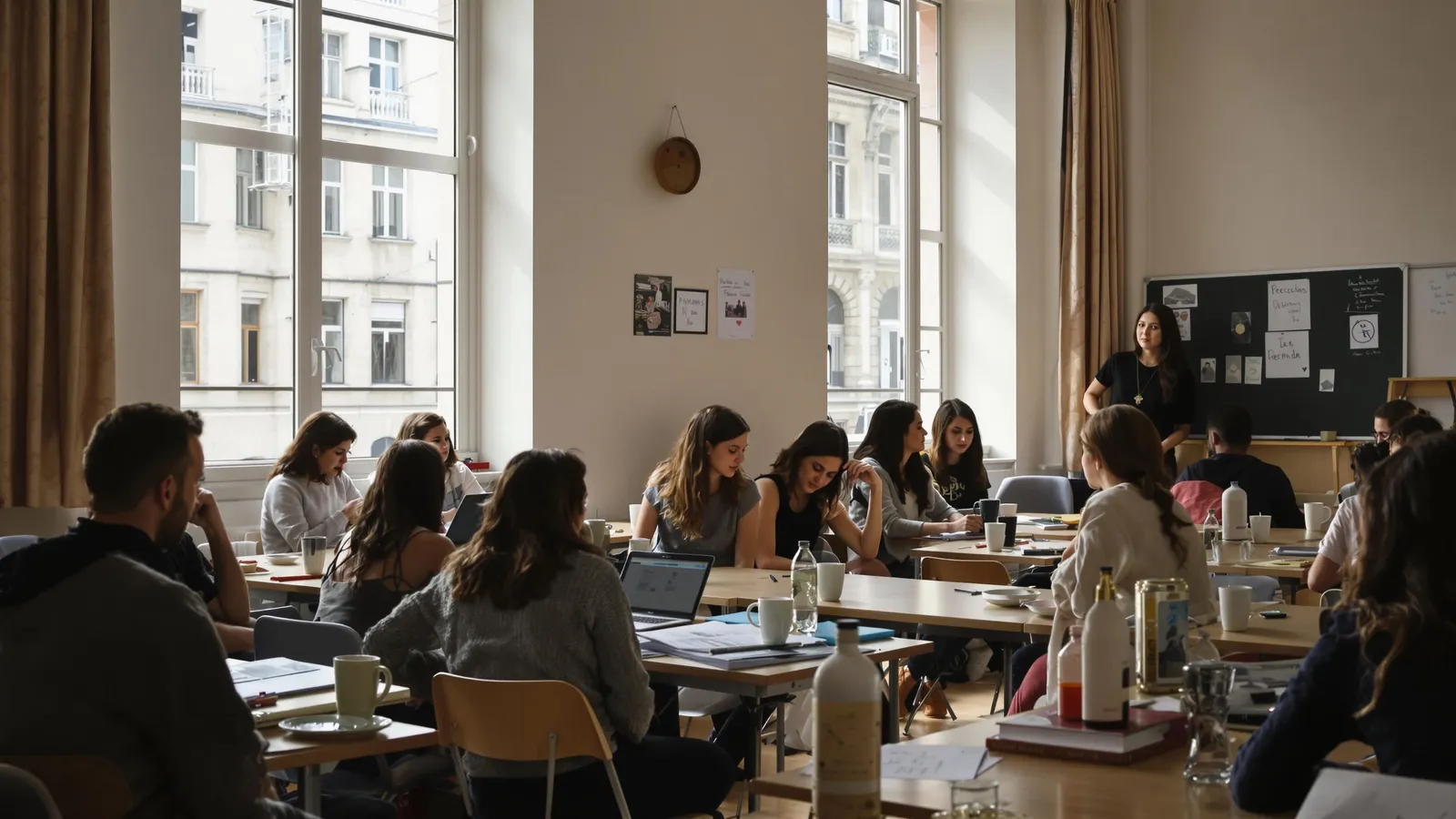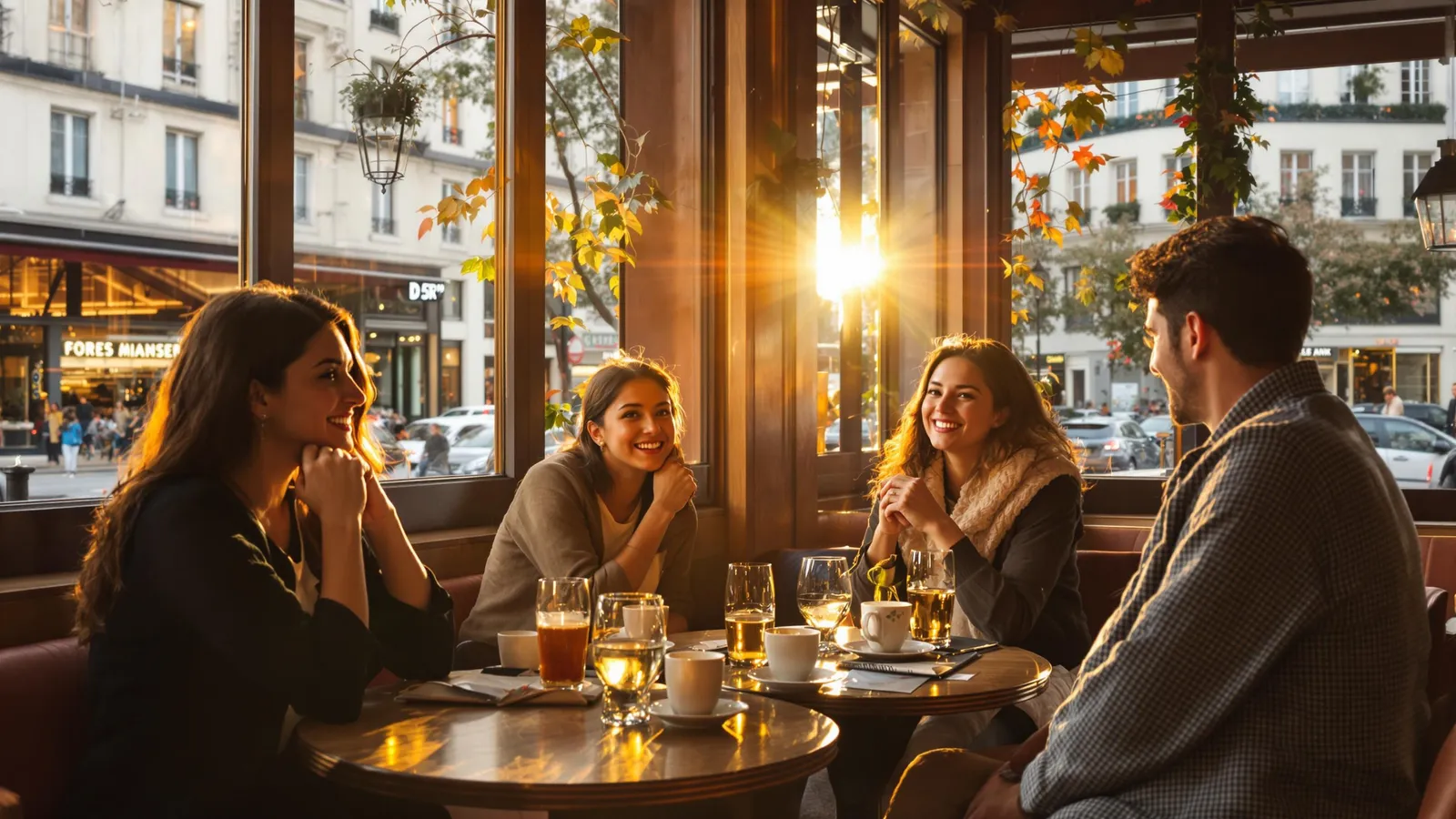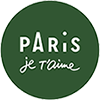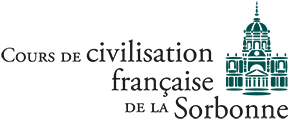Have you ever wondered how French culture has shaped global history and language? French civilization conferences offer a unique gateway to understanding this rich heritage. From medieval kingdoms to modern art movements, these sessions delve into the heart of France’s cultural evolution.
With over 80% of research in French studies rated as world-leading, these conferences provide more than just historical insights. They enhance your French proficiency while exploring art, literature, and traditions. Discover how these programs can deepen your appreciation of France’s global influence.
Sommaire
- Immersive Journey Through French Cultural Heritage
- Architectural and Artistic Mastery Across Centuries
- Living Traditions From Kitchen to Festival
- Academic Pathways to Cultural Fluency
Immersive Journey Through French Cultural Heritage
Historical Insights That Shape Modern France
French civilization conferences delve into key historical periods that have shaped the nation’s identity. Here are five transformative eras covered in the lectures:
- Carolingian Empire: Explore how Charlemagne’s reign laid the foundation for modern European culture and governance, influencing French language and traditions.
- Renaissance: Discover the flourishing of art, literature, and science in France, marked by figures like François I and the establishment of the Louvre as a royal palace.
- Revolution: Examine the pivotal events of 1789 that redefined French society, introducing concepts of liberty, equality, and fraternity.
- Colonial Era: Understand France’s global influence during its colonial expansion and its lasting impact on Francophone cultures worldwide.
- Post-War Modernization: Analyze how France rebuilt itself after World War II, embracing technological innovation and becoming a leader in European integration.
These historical insights provide a deeper understanding of France’s cultural and political evolution. For further exploration of these connections, read our article on History, Literature, Culture: French Civilization and its Language, which delves into the interplay between France’s history and its cultural expressions.

Linguistic Bridges Between Past and Present
Language is a living testament to France’s cultural evolution, and French civilization conferences provide a unique opportunity to explore its transformation. From the Latin roots of Old French to the emergence of modern verlan slang, these sessions decode the linguistic shifts that reflect societal changes. By studying ancient texts and contemporary media, participants gain a deeper understanding of how language has been shaped by historical events and cultural movements.
The following table outlines the language proficiency milestones achieved through these conferences:
| Proficiency Level | Vocabulary Expansion | Historical Texts Comprehension | Contemporary Media Analysis | Cultural Context Integration |
|---|---|---|---|---|
| B1 (Intermediate) | 500-700 new words related to French history and culture | Understanding simplified historical documents from the 19th century | Analyzing contemporary news articles with guidance | Basic understanding of French cultural references in language |
| B2 (Upper Intermediate) | 1000-1500 specialized terms in art, literature, and politics | Reading original texts from the Renaissance period | Interpreting French films and TV shows with subtitles | Connecting language usage to specific historical periods |
| C1 (Advanced) | 2000+ academic and cultural terms across various disciplines | Deciphering medieval manuscripts and philosophical works | Critically analyzing French media and social discourse | Understanding regional linguistic variations and their cultural significance |
| C2 (Proficient) | Mastery of idiomatic expressions and technical terminology | Interpreting complex legal and literary texts from different eras | Engaging in sophisticated media analysis and cultural criticism | Fluently navigating cultural nuances in various professional contexts |
These milestones demonstrate how French civilization conferences bridge the gap between historical and modern language usage, offering a comprehensive approach to linguistic and cultural mastery.
Architectural and Artistic Mastery Across Centuries
From Gothic Cathedrals to Haussmann’s Paris
France’s architectural heritage is a testament to its cultural and historical significance. French civilization conferences explore the evolution of design, from the soaring Gothic cathedrals like Notre-Dame to the grand boulevards of Haussmann’s Paris. These architectural marvels not only reflect the technical innovations of their time but also embody the societal values and aspirations of each era.
As noted by the Encyclopedia Britannica, French architecture has played a pivotal role in shaping global design trends. The conferences also examine how contemporary architects are reinterpreting traditional styles to address modern challenges, such as sustainability and urban density. By studying these architectural transformations, participants gain a deeper appreciation of France’s enduring influence on the built environment.
Decoding France’s Artistic Revolution
French civilization conferences offer a comprehensive exploration of the artistic movements that have defined France’s cultural landscape. Here are four art movements redefined in the lectures:
- Impressionism: Study the groundbreaking techniques of Monet and Renoir, who captured light and movement in ways that revolutionized art.
- Cubism: Explore Picasso and Braque’s geometric rebellion, which challenged traditional perspectives and redefined artistic expression.
- Nouveau Réalisme: Discover how artists like Yves Klein and Niki de Saint Phalle used everyday objects to critique consumer culture.
- Street Art Evolution: Trace the rise of urban art in France, from Blek le Rat to JR, and its role in contemporary cultural discourse.
These movements highlight France’s enduring influence on global art and its commitment to innovation and creativity. By studying these artistic revolutions, participants not only enhance their appreciation of French culture but also gain insights into the broader historical and social contexts that inspired these works.
Living Traditions From Kitchen to Festival
Culinary Diplomacy Through the Ages
French cuisine is more than just a gastronomic delight; it is a reflection of the nation’s history and cultural diplomacy. French civilization conferences trace the evolution of French culinary traditions, from the lavish banquets of Louis XIV to the Michelin-starred restaurants of today. These sessions explore how food has been used as a tool for political alliances, cultural exchange, and national identity.
Festival Culture as Social Mirror
Festivals in France are more than just celebrations; they are a reflection of the nation’s values, history, and societal changes. French civilization conferences explore how events like the Cannes Film Festival and local vendanges celebrations provide insights into French culture. These gatherings not only preserve traditional rituals but also serve as platforms for contemporary artistic and social expression.
Academic Pathways to Cultural Fluency
Structured Learning for Lasting Mastery
French civilization conferences offer a structured approach to mastering French culture and language. The 12-week program combines lectures, film analysis, and artifact studies to provide a comprehensive learning experience. Participants engage with historical texts, contemporary media, and cultural artifacts, gaining a well-rounded understanding of France’s heritage. The program also emphasizes practical application, encouraging students to connect theoretical knowledge with real-world cultural contexts.
Networking opportunities are a key component of the program, allowing participants to interact with francophone scholars and creators. Guest lectures from experts in French history, art, and literature provide valuable insights, while collaborative projects foster a sense of community among participants. These interactions not only enhance learning but also create lasting professional connections. For more details on the program’s structure, visit our page on Courses: French & French Civilization.
The program’s methodology is designed to meet the highest academic standards, as demonstrated by institutions like the University College London (UCL), which also emphasizes rigorous cultural and historical studies. By participating in these conferences, you gain not only knowledge but also the skills to apply this understanding in diverse professional and academic settings.
Certification That Opens Cultural Portals
Earning a certification in French civilization provides significant professional and academic advantages. Here are three key benefits:
- Museum Curator Collaborations: Gain access to prestigious institutions like the Louvre and Musée d’Orsay, where your expertise in French culture can enhance exhibitions and educational programs.
- Diplomatic Service Pathways: Leverage your cultural fluency to work in international relations, representing France’s interests abroad and fostering cross-cultural understanding.
- Luxury Brand Cultural Consultancy: Apply your knowledge to advise global brands like Chanel and Dior, helping them navigate the cultural nuances of French heritage and style.
For more information on the certification process and its benefits, consult our guide on What is the content of a French Civilization course?. This certification not only enhances your professional profile but also deepens your connection to the rich cultural heritage of France.
French civilization conferences offer a unique opportunity to immerse yourself in the rich heritage of France, blending language improvement with cultural exploration. Through detailed studies of history, art, and traditions, participants gain a deeper understanding of French society and its global influence.
As you consider joining these programs, remember that each session brings you closer to mastering both the language and the cultural nuances that define France. The knowledge acquired here will not only enhance your proficiency but also open doors to new perspectives and opportunities.
Take the next step in your journey toward cultural fluency—your future self will thank you for this enriching experience.









